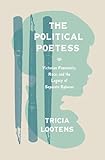The Political Poetess : Victorian Femininity, Race, and the Legacy of Separate Spheres / Tricia Lootens.
Material type: TextPublisher: Princeton, NJ : Princeton University Press, [2016]Copyright date: ©2017Description: 1 online resource (344 p.)Content type:
TextPublisher: Princeton, NJ : Princeton University Press, [2016]Copyright date: ©2017Description: 1 online resource (344 p.)Content type: - 9780691170312
- 9781400883721
- English poetry -- Women authors -- History and criticism
- English poetry -- 19th century -- History and criticism
- Feminism and literature -- Great Britain -- History -- 19th century
- LITERARY CRITICISM / Subjects & Themes / Women
- A Curse for a Nation
- Abolition time
- Alice Walker
- Antigone
- Black Poetess
- Casabianca
- Cheryl Walker
- Dinah Mulock Craik
- Elizabeth Barrett Browning
- Elizabeth Bishop
- Elizabeth V. Spelman
- Ellen Moers
- Emma Lazarus
- Erlene Stetson
- Felicia Dorothea Hemans
- Frances Ellen Watkins Harper
- Fruits of Sorrow
- G.W.F. Hegel
- Harriet Tubman
- J.M.W. Turner
- Julia Ward Howe
- Meridian
- Nightingale's Burden
- Poetess performance
- Poetess reception
- Poetess
- Political Poetess
- Second Wave Poetess criticism
- The Vision of the Czar of Russia
- The Works of Mrs. Hemans
- Victorian femininity
- Victorian studies
- Virginia Woolf
- antislavery poetics
- antislavery
- critical race studies
- displacement
- elegy
- ethical refocalization
- femininity
- feminist criticism
- feminist theory
- haunting
- national sentimentality
- patriotic poetry
- poems
- poetic reading
- political poetics
- private sphere
- race
- sentimental poetry
- separate spheres
- slavery
- suspended spheres
- women
- 821.8099287 23
- PR595.W6
- online - DeGruyter
- Issued also in print.
| Item type | Current library | Call number | URL | Status | Notes | Barcode | |
|---|---|---|---|---|---|---|---|
 eBook
eBook
|
Biblioteca "Angelicum" Pont. Univ. S.Tommaso d'Aquino Nuvola online | online - DeGruyter (Browse shelf(Opens below)) | Online access | Not for loan (Accesso limitato) | Accesso per gli utenti autorizzati / Access for authorized users | (dgr)9781400883721 |
Browsing Biblioteca "Angelicum" Pont. Univ. S.Tommaso d'Aquino shelves, Shelving location: Nuvola online Close shelf browser (Hides shelf browser)

|

|

|

|

|

|

|
||
| online - DeGruyter John Adams and the Fear of American Oligarchy / | online - DeGruyter Marx's Inferno : The Political Theory of Capital / | online - DeGruyter Longing for the Lost Caliphate : A Transregional History / | online - DeGruyter The Political Poetess : Victorian Femininity, Race, and the Legacy of Separate Spheres / | online - DeGruyter Good Form : The Ethical Experience of the Victorian Novel / | online - DeGruyter Reaping Something New : African American Transformations of Victorian Literature / | online - DeGruyter Kierkegaard's Journals and Notebooks, Volume 9 : Journals NB26-NB30 / |
Frontmatter -- Contents -- Introduction: Slaves, Spheres, Poetess Poetics -- Section 1. Racializing the Poetess: Haunting "Separate Spheres" -- Chapter One. Antislavery Afterlives: Changing the Subject / Haunting the Poetess -- Chapter Two. "Not Another 'Poetess'": Feminist Criticism, Nineteenth-Century Poetry, and the Racialization of Suicide -- Section 2. Suspending Spheres: The Violent Structures of Patriotic Pacifism -- Chapter Three. Suspending Spheres, Suspending Disbelief: Hegel's Antigone, Craik's Crimea, Woolf's Three Guineas -- Chapter Four. Turning and Burning: Sentimental Criticism, Casabiancas, and the Click of the Cliché -- Section 3. Transatlantic Occasions: Nineteenth-Century Antislavery Poetics at the Limits -- Chapter Five. Teaching Curses, Teaching Nations: Abolition Time and the Recoils of Antislavery Poetics -- Chapter Six. Harper's Hearts: "Home Is Never Natural or Safe" -- Notes -- Works Cited -- Acknowledgments -- Index
restricted access online access with authorization star
http://purl.org/coar/access_right/c_16ec
The Political Poetess challenges familiar accounts of the figure of the nineteenth-century Poetess, offering new readings of Poetess performance and criticism. In performing the Poetry of Woman, the mythic Poetess has long staked her claims as a creature of "separate spheres"-one exempt from emerging readings of nineteenth-century women's political poetics. Turning such assumptions on their heads, Tricia Lootens models a nineteenth-century domestic or private sphere whose imaginary, apolitical heart is also the heart of nation and empire, and, as revisionist histories increasingly attest, is traumatized and haunted by histories of slavery. Setting aside late Victorian attempts to forget the unfulfilled, sentimental promises of early antislavery victories, The Political Poetess restores Poetess performances like Julia Ward Howe's "Battle Hymn of the Republic" and Emma Lazarus's "The New Colossus" to view-and with them, the vitality of the Black Poetess within African-American public life.Crossing boundaries of nation, period, and discipline to "connect the dots" of Poetess performance, Lootens demonstrates how new histories and ways of reading position poetic texts by Felicia Dorothea Hemans, Elizabeth Barrett Browning, Dinah Mulock Craik, George Eliot, and Frances E. W. Harper as convergence points for larger engagements ranging from Germaine de Staël to G.W.F. Hegel, Virginia Woolf, Elizabeth Bishop, Alice Walker, and beyond.
Issued also in print.
Mode of access: Internet via World Wide Web.
In English.
Description based on online resource; title from PDF title page (publisher's Web site, viewed 24. Aug 2021)


